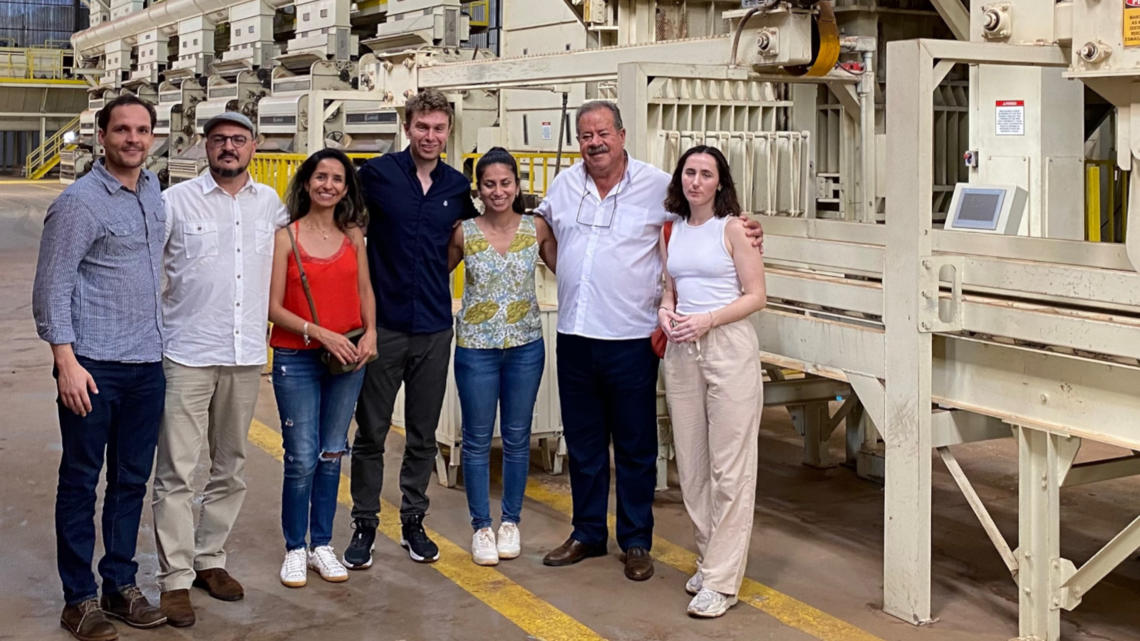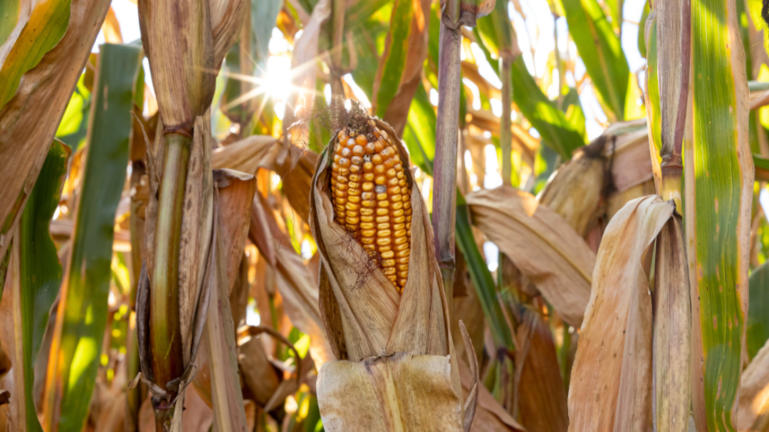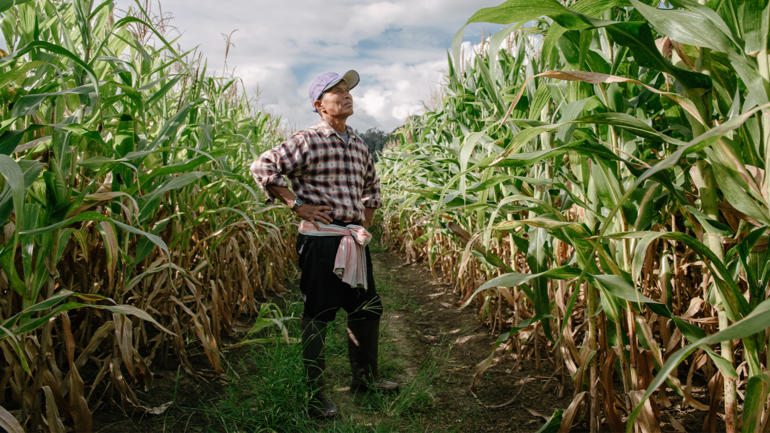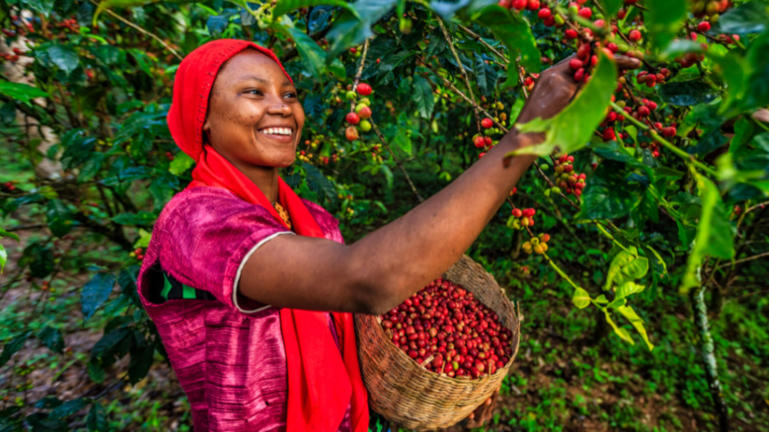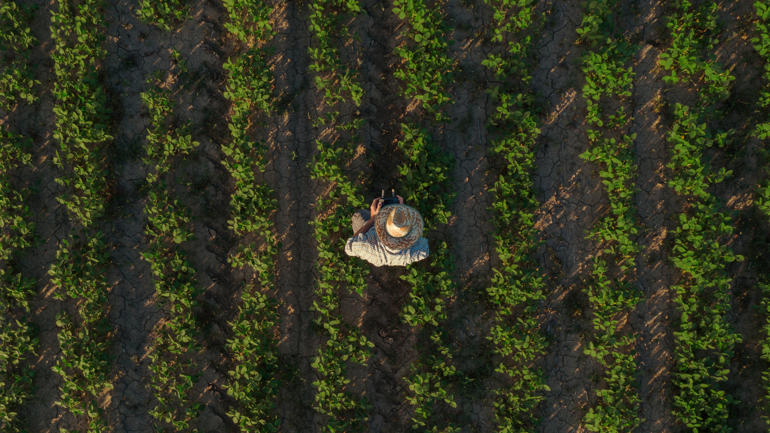During the week of 20 March 2023, representatives of the UK government joined the Soft Commodities Forum (SCF) on a field trip to Western Bahia – one of the focus landscapes of the SCF’s Farmer First Clusters landscape investment initiative. The trip participants took a deep dive into the challenges and opportunities for deforestation- and conversion-free commodities production in the Brazilian Cerrado.
The trip takes place in the midst of growing momentum around the development and implementation of solutions that decouple agri-commodity production from land clearing practices. Stakes are high in ecosystems like the Cerrado, where nature-rich native lands are critical for supporting global climate targets as well as targets for nature and biodiversity.
Following the supply chain upstream, the field trip started in the Aratu Port where the group explored first-hand the challenges behind segregation and mass balance logistics ahead of soy exportation. A thousand kilometers inland, the delegation had the opportunity to meet with farmers at AIBA, a major producer association representing 1300 farmers in a landscape of 14 million hectares – an area the size of England or 3,5 times Switzerland – to learn about the challenges related to the Brazilian land registry (CAR) and water management projects.
In Luis Eduardo Magalhães, at the heart of Western Bahia, a farm visit was hosted by a major soy and cotton producer who pointed with excitement to Brazil’s potential to expand agricultural production over the more than 50 million hectares of available degraded pastureland, without need to clear or convert native vegetation. The visit shed a light on the role of digital technologies and bio-inputs to increase productivity and ensure better climate and biodiversity metrics.
For the visit participants, time spent learning in the Cerrado feeds into a shared recognition of the importance of collaboration on solutions to reduce forest loss, increase restoration and support sustainable production and farmer livelihoods, while keeping in mind the context of each unique landscape.
For the UK government, interest in the Brazilian Cerrado falls under a broad commitment to halting global deforestation as part of the Forests and Climate Leaders Partnership (FCLP) and as a founder of the Forest, Agriculture and Commodity Trade (FACT) Dialogue. The FCLP gathers a collection of Heads of State and Ministers who provide combined political support to halting and reversing deforestation and land degradation through a multi-stakeholder approach. These efforts work in parallel with the FACT Dialogue, a government-to-government collaboration that partners with leading international commodity producers to protect ecosystems and promote sustainable trade.
"As a member of both the FCLP and the FACT Dialogue, the UK Government views this visit to the Cerrado as part of their efforts to amplify attention given to specific challenges and solutions to building deforestation- and conversion-free commodity production and trade. There is no pathway to meeting the goals of the Paris Agreement without scaled up action to tackle emissions from our global food system,” said David Saddington, Head of Sustainable Supply Chains, Department for Energy Security and Net Zero.
The UK government’s international collaborations set the stage for ground-level action, which can only be achieved by presenting viable transition pathways for producing communities. Initiatives like the SCF’s Farmer First Clusters landscape investment model aim to present such pathways, providing the following benefits in practice:
- Protect native vegetation by providing payments for avoided deforestation and conversion;
- Contribute to the emergence of nature-positive landscapes by restoring native habitats and diverting soy expansion to degraded pastures; and
- Demonstrate producer compliance with local legislation and raise productivity through farm extension services.
The Farmer First Clusters initiative was built through a multistakeholder process, instigated by the SCF’s 6 member agri-businesses – ADM, Bunge, Cargill, COFCO International, Louis Dreyfus Company and Viterra. The initiative maximizes impacts for climate, nature and equity by delivering landscape-specific incentives that put farmers at their center. The solutions – all dedicated to reducing the opportunity cost of deforestation and native vegetation conversion – cover financial compensation payments for surplus legal reserve, technical assistance for sustainable production, restoration of native vegetation, integrated farming and expansion over pastureland. In doing so, the solutions support the transition to forest positive land use management and commodity production, present benefits to producer livelihoods, and showcase collective action in key soy-producing landscapes.
The investment model’s direct engagement with land-use decisions in the Cerrado also delivers on the commitments of SCF member companies as signatories to the Agriculture Sector Roadmap to 1.5°C. The roadmap presents an action plan developed by 14 of the world’s leading agri-commodity traders to accelerate action toward deforestation-free commodity supply chains in line with a 1.5°C pathway. The Farmer First Clusters initiative addresses Pillar 2 of the roadmap - Transformation of Commodity-Producing Landscapes - by shifting the economics of land use change, enabling farmers to conserve lands and produce soy sustainably.
Nevertheless, transformation is a complex process, and as the Farmer First Clusters initiative begins to implement solutions in Western Bahia and other Cerrado landscapes, the SCF calls on value chain partners and stakeholders to support the scaling of solutions across the Cerrado and beyond. Investments contribute to ensuring that Cerrado landscapes are protected from deforestation and native vegetation conversion, through financially viable and sustainable soy production.

